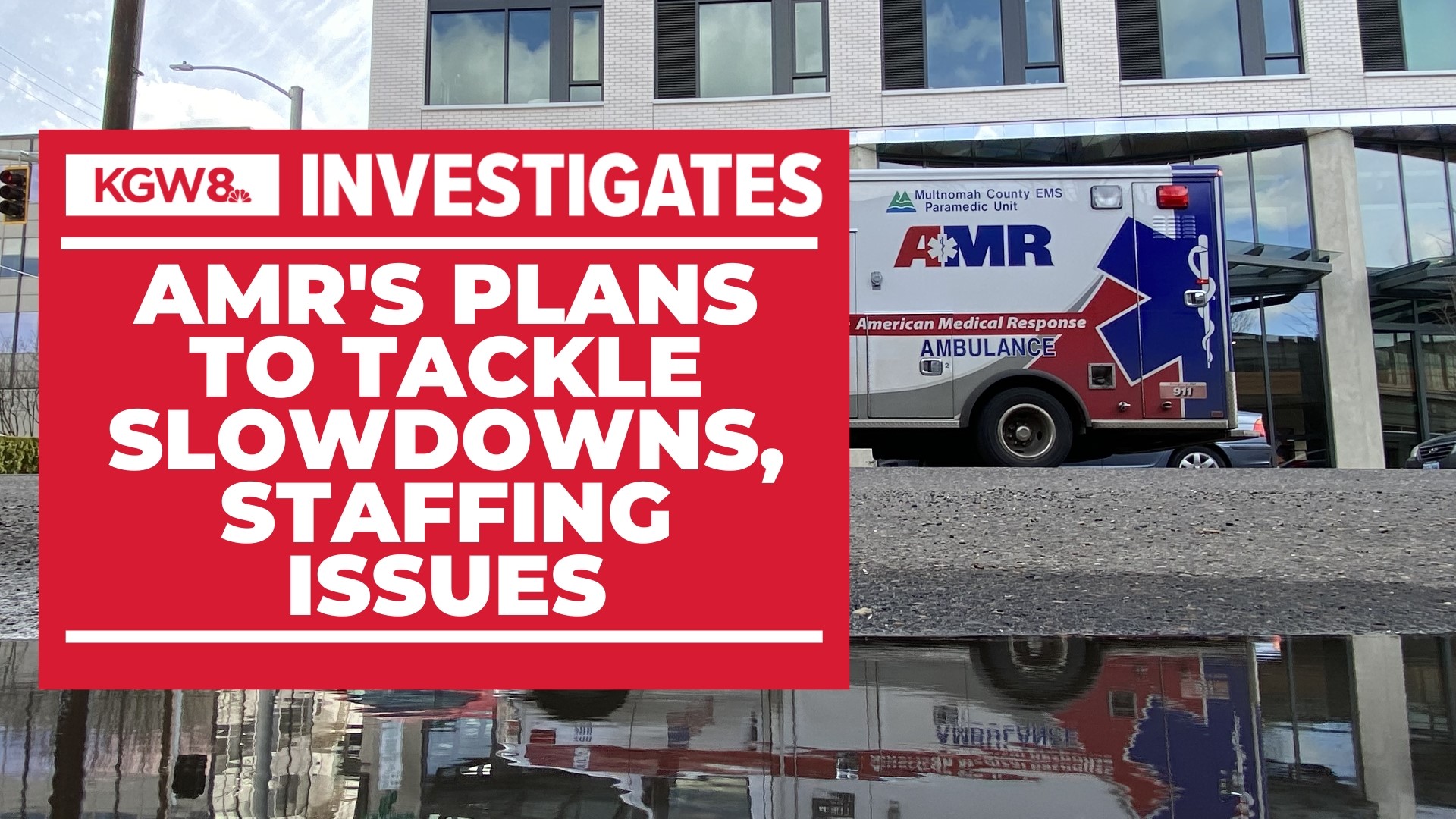PORTLAND, Oregon — Ambulance provider American Medical Response, or AMR, recognized its issues with staffing shortages and slow response times in a statement Thursday, laying out the company's plan to improve emergency care throughout the region.
AMR currently manages emergency medical services in Multnomah County, Clackamas County and Clark County — and it will expand to cover Washington County starting on August 1.
The company has faced criticism in recent months for slow response times, staffing issues and failed standards within county contracts.
"AMR understands that it is responsible for staffing all its operations in the region and meeting contract obligations in each community," said AMR in a 1,300-word statement Thursday. "We take that responsibility seriously. We want to assure the public that we are doing everything we can to meet those responsibilities and will continue to adapt, review and make the changes necessary in order to provide a world-class EMS system for our communities."
In Multnomah County, AMR ambulances have been unavailable to immediately respond to more than 6,300 emergency calls since January — a product of staffing problems and high demand.
Paramedic crews in Oregon's most populated county have been late to respond to about 1 out of every 3 emergency calls, taking longer than eight minutes to arrive, the standard for urban areas.
AMR blames issues in Multnomah County on staffing shortages it says are exacerbated by the county's two-paramedic requirement for ambulance crews. It calls for a switch to the "state and national" standard of one paramedic and one emergency medical technician.
"Despite extraordinary efforts to recruit and incentivize paramedics to work at our Multnomah operation, our response times have declined disproportionately to our neighboring counties in the last six months," AMR said in its release. "A temporary staffing change to [a] Paramedic/EMT [model] would provide a strong solution that would sustain the system until the Paramedic workforce improves on a national scale."
EMTs require less training than paramedics and are more limited in the type of emergency care they can provide. EMTs also make less money than paramedics, per contracts between AMR and unions.
Multnomah County has pushed back on AMR's request to change its long-standing requirement of two paramedics for ambulances.
"Two well-trained paramedics are always better prepared, less stressed and experience less fatigue and burn out than one paramedic working alone," said a county spokesperson in June.
In the release, the company said its issues are reflective of a broader national trend of a shortage of paramedics, delays at hospitals and emergency departments, growing demand for mental health services and the misuse of 911.
AMR said it "acknowledges the challenges" with response times and staffing elsewhere, too.
The company said it has made good advancements to return to compliance in Clark County, where dispatchers haven't had an available ambulance crew to send to an emergency call on at least 850 occasions this year.
AMR said Clackamas County has been the least affected due to strong workforce retention, adding that slow response times have been seen "only in recent months" and AMR is "already beginning to see incremental progress toward full compliance."
The emergency medical services provider also shared details on the number of staff members it needs to hire to reach full staffing levels as of July 13:
- Clackamas County - AMR needs five paramedics and four EMTs to reach a complete staff of 48 paramedics and 42 EMTs
- Clark County - AMR needs nine paramedics and 13 EMTs to reach a complete staff of 61 paramedics and 79 EMTs
- Multnomah County - AMR needs 38 paramedics to reach a complete staff of 275 paramedics
- Washington County - AMR needs nine paramedics to reach a complete staff of 50 paramedics. The company said it has already hired all EMTs needed for service in Washington County
In the release, AMR shared what it's doing to fix the problems with ambulance service in the region.
In Multnomah County, AMR said it's working to retain current paramedics through pay increases of up to 30% through 2025, paramedic scholarships for existing employees and relocation assistance of up to $5,000 for new first responders.
In Clark County, in addition to the pay increases and scholarships, AMR said it's offering hiring bonuses for paramedics who agree to a 1-year employment contract, referral bonuses for current staff and non-EMT positions for students enrolled in EMT training courses.
Additionally, the company outlined its plans to triage emergency response, with the goal of increasing efficiency in emergency response.
AMR has started multiple "Basic Life Support" or BLS pilot programs. BLS teams, made up of two EMTs, would be dispatched to low-acuity calls, ideally freeing up the "Advanced Life Support" or ALS teams so they can respond to more emergent issues.
The company has also started a "Nurse Navigation" program in Clark County that routes non-emergency 911 calls to nurses to "determine an appropriate path for treatment and assist in coordinating access to care" — another way to relieve the workload burden on ambulance crews.
AMR said it "continues" to recommend the Nurse Navigation program to Multnomah County to help handle high levels of mental health and social services calls.
Sixteen EMTs in Multnomah County started their BLS work on July 3 and are "now responding to low acuity calls following an ALS assessment," according to AMR.
"With our national reach and extensive history serving the citizens of Northwest Oregon and Southwest Washington, we have the experience and knowledge to work with all stakeholders to find solutions and overcome our current challenges," AMR said. "We remain committed to keeping the community informed of our progress."
AMR is owned by national company Global Medical Response. GMR currently has $4.3 billion in debt that will become due in 2025.

